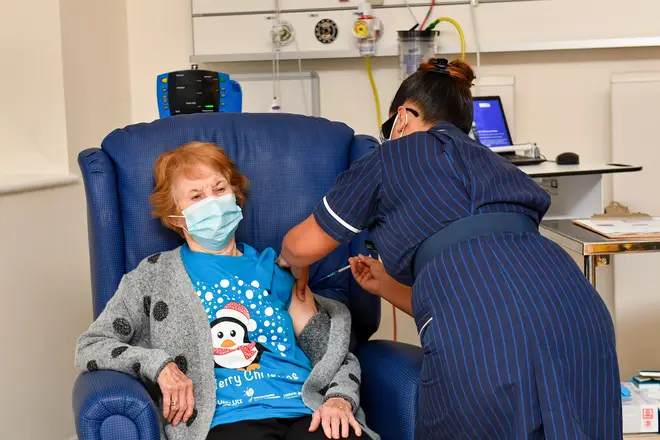
Nick Ferrari 7am - 10am
29 December 2020, 11:43 | Updated: 29 December 2020, 16:35

The first patient to be given a dose of the Pfizer/BioNTech vaccine has received her second dose today, meaning she should be immune from Covid-19 in the coming days.
Margaret Keenan, 91, became the first person to get the jab at 6.31am on 8 December, describing it as “the best early birthday present.
The grandmother was amongst the first to receive her second jab, with immunity coming seven days after the second dose.
Two doses of the Pfizer/BioNTech Covid-19 vaccine are needed to reach 95 percent effectiveness, with each given 21 days apart.
Speaking on Christmas Eve, Prime Minister Boris Johnson said almost 800,000 people had been given their first dose of the two-stage vaccine.
Read more: 'Back in the eye of the storm': Covid patients in hospital pass April peak
Read more: Covid-19 crisis in numbers: LBC brings you the stats you need to know

Chelsea Pensioners offered ‘early Christmas present’ of coronavirus vaccine
The rollout to care homes began in England on Wednesday 16 December, with jabs even given on Christmas Day, as the UK looks to ramp up the number of people immunised each week.
Fantastic to see Margaret Keenan receive her second dose of the @Pfizer/@BioNTech_Group #coronavirus vaccine
— Matt Hancock (@MattHancock) December 29, 2020
We will get through this pandemic, together.https://t.co/jDZq6c0Ths
The Oxford/AstraZeneca jab is also expected to be approved imminently by the Medicines and Healthcare products Regulatory Agency.
The UK has ordered 100 million doses of the Oxford vaccine, which can be transported more easily than the Pfizer jab, which must be stored at -70C.
Read more: Boxing Day 'busiest ever for London paramedics' as Covid patients near April peak

Boris Johnson: Over 500,000 people in UK have received first Covid vaccine dose
NHS England chief executive Sir Simon Stevens said there is a "chink of hope" in the various Covid-19 vaccines.
"We think that, by late spring, with vaccine supplies continuing to come on stream, we will have been able to offer all vulnerable people across this country Covid vaccination,” Sir Simon said.
"That perhaps provides the biggest chink of hope for the year ahead."
Read more: Primary, Year 11 and Year 13 pupils will return to schools next week despite Covid fears
Read more: Plea for medical students to staff ICU wards as Covid hospitalisations surge

"Highly unlikely" new variant will impinge the vaccine, says Hancock
Calum Semple, professor of outbreak medicine at the University of Liverpool and a member of the Scientific Advisory Group for Emergencies (Sage), described the Oxford/AstraZeneca vaccine as a "game changer" but warned "herd immunity" through vaccination would not be likely until the summer.
It comes as hospitals struggle to cope with the surge in coronavirus patients, while trusts have been told to begin planning for the use of Nightingale hospitals.
But there are cries from staff that they do not have the numbers needed to staff the massive centres, despite the ever-increasing numbers of patients.
Dr Yvonne Doyle, medical director at Public Health England, said: "This very high level of infection is of growing concern at a time when our hospitals are at their most vulnerable, with new admissions rising in many regions."
Read more: Military to support mass testing of pupils in England schools
Read more: Russia admits Covid-19 death toll is three times worse than claimed

Covid vaccine: Medical advice for people with allergies
Saffron Cordery, deputy chief executive of NHS Providers, said some trusts are reporting up to three times the number of Covid patients than at the peak of the first wave.
"This means hospitals and also ambulance services in Tier 4 areas and beyond are incredibly busy, compounded by increasing staff absences due to illness and the need to self-isolate," she said.